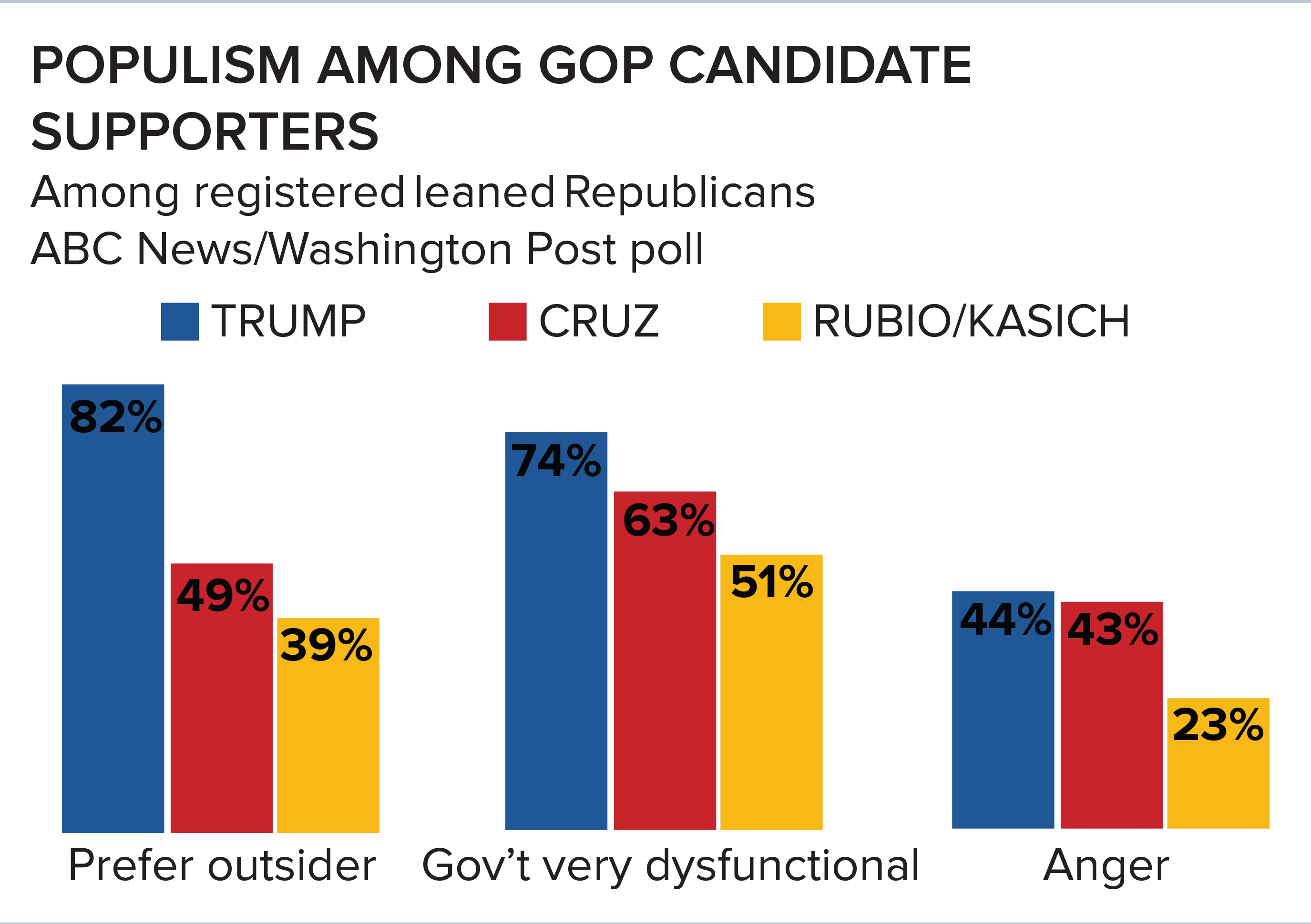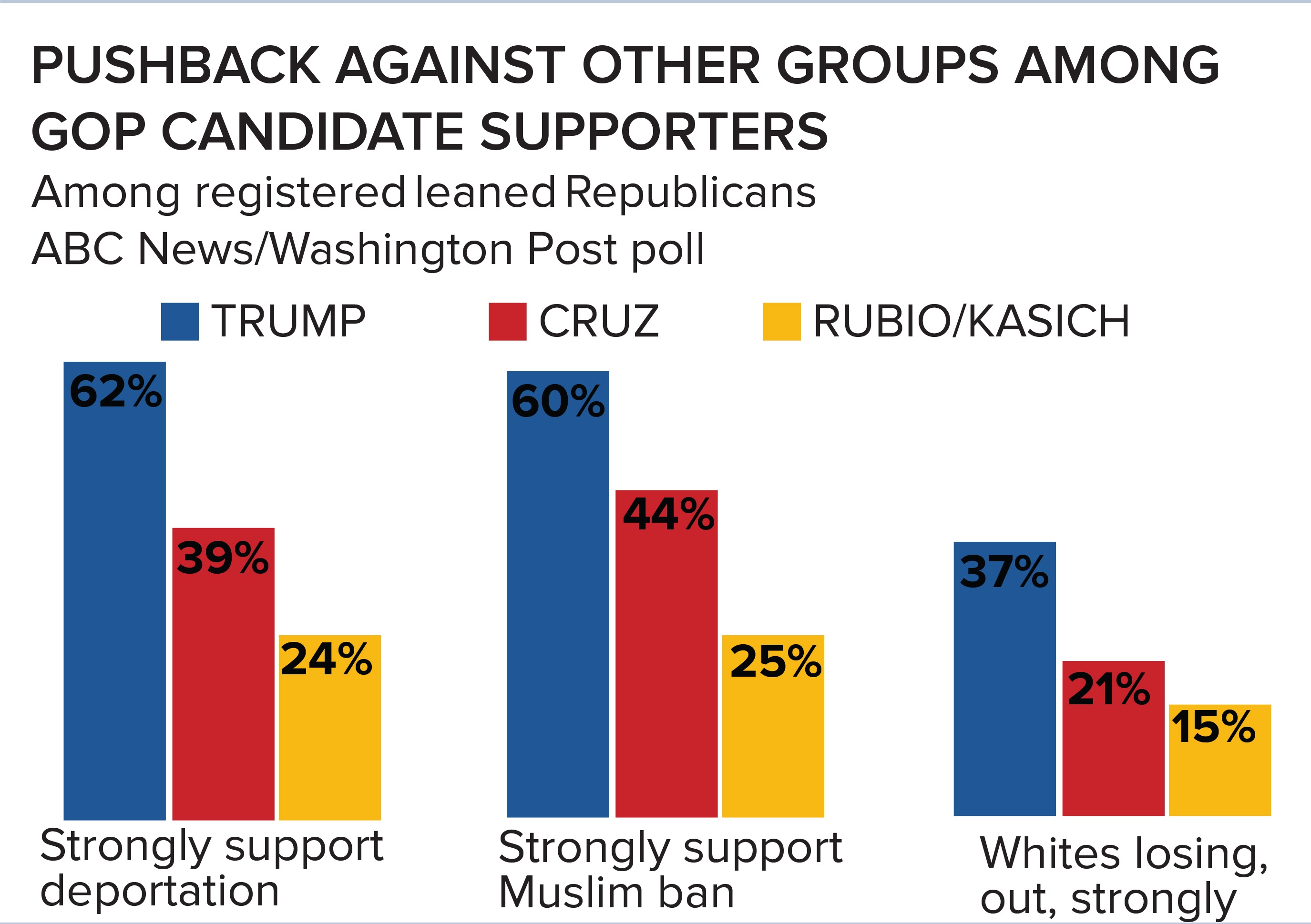
Gov. John Kasich is running a close race in his home state, but Sen. Marco Rubio isn’t faring so well in Florida. Tuesday’s states will have a big effect on the delegate counts. And Sen. Bernie Sanders is running close to Hillary Clinton in the Midwest. This is HuffPollster for Monday, March 14, 2016.
KASICH COULD STYMIE TRUMP IN OHIO - Home state advantage might help Gov. John Kasich notch his first primary win in Ohio on Tuesday. Kasich leads or ties frontrunner Donald Trump in the last four polls conducted in the state. According to HuffPost Pollster's average, the two candidates are in a dead heat, with Trump taking 37.7 percent of the vote to Kasich's 37.4 percent. Kasich’s average share of the vote has risen nearly 10 points in the last month.
Rubio faces a much bigger challenge in Florida - Rubio lags 22 points behind Trump, taking an average 23 percent to Trump's 45 percent in Florida, according to HuffPost Pollster. One recent poll, from CBS/YouGov, shows Rubio sinking to third behind both Trump and Texas Sen. Ted Cruz. Unless the polls are off as badly as they were in the Michigan Democratic race, home-state advantage won't be enough for Rubio on Tuesday.
HUFFPOLLSTER VIA EMAIL! - You can receive this daily update every weekday morning via email! Just click here, enter your email address, and click "sign up." That's all there is to it (and you can unsubscribe anytime).
FLORIDA AND OHIO ALLOCATE ALL OF THEIR DELEGATES TO THE WINNERS - Florida has 99 delegates and Ohio has 66. Ted Mellnik and Weiyi Cai: "If Trump sweeps Florida and Ohio, he could clinch the nomination by winning just more than half of the remaining bound delegates that are in play on Tuesday and afterward….Meanwhile, it gets much harder for Trump to win -- and significantly easier for his opponents to stop him -- if Trump loses Florida, Ohio or both. But Trump remains basically the only candidate who appears likely to get the 1,237 delegates needed to clinch the nomination before the Republican National Convention. Under all four possible Florida-Ohio scenarios, Cruz would need at least 77 percent of remaining delegates to clinch the nomination -- a feat that seems unlikely at this time." [WashPost]
But Illinois and Missouri could also become winner-take-all - David Wasserman: "Florida and Ohio are hyped up not only because of their favorite sons (for good reason), but also because they are the only “true” winner-take-all states...However, Illinois and Missouri could functionally become winner-take-all too. Both states award their delegates on a congressional-district level. So if Trump (or someone else) sweeps their congressional districts, that candidate will win all the delegates. Together, Missouri and Illinois will award 121 delegates — which would go a long way in helping Trump stay “on track” for the nomination even if he loses either Florida or Ohio." [538]
CLINTON AND SANDERS IN TIGHT RACE IN SEVERAL STATES - Daniel Strauss and Natasha Korecki: "The Vermont senator comes in with some momentum after his upset victory Tuesday in Michigan, and figures to be competitive in at least three of Tuesday’s five Democratic presidential primaries: Illinois, Missouri and Ohio. In the other two states, North Carolina and Florida, Hillary Clinton has the clear advantage. [Sen. Bernie] Sanders has been crushed everywhere south of the Mason-Dixon line, largely because of Clinton’s landslide margins among African-Americans -- and North Carolina and Florida have large black populations.” [Politico]
Polling averages show similar patterns - The HuffPost pollster averages show Clinton well ahead in Florida and North Carolina. She leads Sanders by a smaller, but still substantial average in the Ohio polls. Sanders has the edge in Illinois, however, and Missouri doesn’t have enough polls to produce an average.

TRUMP SUPPORTERS DRIVEN BY POPULISM AND PUSHBACK - Chad Kiewiet de Jonge: "A reality-TV-star billionaire businessman tears up the rules and vaults to the brink of the Republican nomination for president, begging the political question of the year: What is support for Donald Trump all about? The answer, according to statistical analysis of an array of possible explanations tested in the latest ABC News/Washington Post poll, reflects two related but ultimately distinct sets of attitudes: Anti-establishment populism and pushback against outside groups. One is rooted in economic discontent; the other, in a desire among some Americans for traditional authority…None of these alone explains Trump’s support in the GOP race, nor – especially – do core demographics such as political ideology, gender, age, education or religious belief….Struggling in the post-recession economy and drawn to traditional authority, they’re attracted to a populist outsider who offers strong anti-establishment credentials, protection against competing groups and a potent stance against the current social and political climate." [ABC]
Where is Trump's support highest? - Neil Irwin and Josh Katz: "Trump counties are places where white identity mixes with long-simmering economic dysfunctions. The places where Trump has done well cut across many of the usual fault lines of American politics — North and South, liberal and conservative, rural and suburban. What they have in common is that they have largely missed the generation-long transition of the United States away from manufacturing and into a diverse, information-driven economy deeply intertwined with the rest of the world….Mr. Trump has his share of support from the affluent and the well educated, but in the places where support for Mr. Trump runs the strongest, the proportion of the white population that didn’t finish high school is relatively high. So is the proportion of working-age adults who neither have a job nor are looking for one. The third-strongest correlation among hundreds of variables tested: the preponderance of mobile homes." [NYT]
MONDAY'S 'OUTLIERS' - Links to the best of news at the intersection of polling, politics and political data:
-Prediction markets favor Hillary Clinton and Donald Trump to win in four out of five primary states on Tuesday. [PredictWise]
-Trump is deeply unpopular among non-white voters. [LA Times]
-Republicans are not all that bothered by Trump's anti-Muslim rhetoric. [HuffPost]
-Iowans narrowly prefer their caucus system to a primary. [DMR]
-Andrew Gelman explains why statistics can be like basketball or knitting. [Andrew Gelman]

